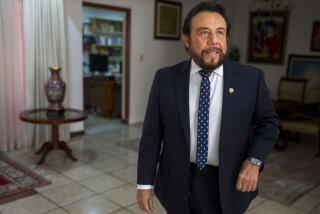Salvador General Skeptical of Peace Plan
SAN SALVADOR — Gen. Adolfo Blandon, head of the Salvadoran joint chiefs of staff, said Tuesday he is skeptical about the future of a Central American peace plan and accused the Sandinistas of using the accord to consolidate their power in Nicaragua and expand their influence throughout the region.
In issuing a year-end military review, Blandon also said that leftist Salvadoran guerrillas have stepped up their attacks since the five Central American presidents signed the agreement on Aug. 7 to end the region’s wars. He said Salvadoran armed forces casualties rose in 1987.
Blandon said he did not expect to see any progress toward peace from a meeting of the five presidents scheduled for Jan. 15 in Costa Rica. The aim of the meeting is to assess the progress made in implementing the peace pact.
“The Nicaraguans are only looking for space and time to consolidate and in the end they are going to pull out of the pact,” he said.
Referring to revelations by a Sandinista defector, Maj. Roger Miranda Bengoechea, that Nicaragua plans to maintain a large army and reserve force and to acquire advanced weaponry, including up-to-date Soviet MIG-21 fighters, Blandon said, “Nicaragua is preparing for actions that go beyond the security of Nicaragua. . . . We think it could be for propagating their Marxism in the rest of the Central American countries.”
The Nicaraguan government has confirmed the long-term military plans but says they are negotiable if the U.S.-backed Contra war stops. Sandinista officials and some military analysts say the plans are defensive rather than offensive.
Interviewed Defector
U.S. and Salvadoran officials allege that the Sandinistas continue to provide training, logistical support and military aid to the Salvadoran insurgents, although required by the terms of the peace pact to stop such aid. The Salvadoran defense minister, Gen. Carlos Vides Casanova, interviewed Miranda in Washington for five hours last week, Blandon revealed, but has not made public details of what he learned.
Blandon said the Salvadoran military suffered 3,285 casualties so far this year--470 dead and 2,815 wounded. Figures for the same period last year were not available, but in the 12 months ending May 31, the armed forces suffered 2,607 casualties.
Blandon said the higher casualty rate was due to the fact that the army has been more aggressive in pursuing the guerrillas this year, but he also said the rebels have increased their attacks on army positions and military convoys.
The Farabundo Marti National Liberation Front guerrillas claim that the army has suffered more than 8,000 casualties this year. Guerrilla commander Ferman Cienfuegos said in a recent interview that the army only counts very seriously wounded in its casualty count.
The guerrillas do not give their own casualty figures. Blandon claimed that they suffered 1,004 dead and 670 wounded this year.
Both the government and guerrillas have said that they will not even attempt a Christmas cease-fire as they have in other years.
A round of cease-fire talks was held in October, as called for by the peace plan, but the guerrillas suspended a second round after the assassination of an opposition human rights worker. The government has refused to resume the talks.
Blandon charged that extreme polarization of El Salvador’s political parties and business sectors is aiding the guerrillas in the war to oust the U.S.-backed government of President Jose Napoleon Duarte.
“Political polarization only favors the subversives. The war is not just military, but social, political and economic,” Blandon said.
He acknowledged that sectors of the extreme right are pushing the military to stage a coup.
“They may try to win over the officers for such a plan, but the officers and the people are (politically) aware. I personally don’t think there will be a coup,” he said.
More to Read
Sign up for Essential California
The most important California stories and recommendations in your inbox every morning.
You may occasionally receive promotional content from the Los Angeles Times.










